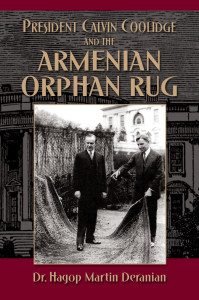ARLINGTON, Mass.—“The beautiful rug woven by the [Armenian] children in the [Ghazir] orphanage in the Lebanons has been received. This, their expression of gratitude for what we have been able to do in this country for their aid, is accepted by me as a token of their goodwill to the people of the United States… The rug has a place of honor in the White House, where it will be a daily symbol of good-will on earth.” These words written by President Calvin Coolidge on Dec. 4, 1925, were made in response to Dr. John H. Finley, the vice-chairman of the Near East Relief Executive Committee, who presented the rug from the Armenian orphans who had “tied into it the gratitude of tens of thousands of children to you and to America. And what they have tied into it will never be untied… It is sent to adorn the dearest of our temples, the White House of our President.”

On Sun., Oct. 20 at 3 p.m., the Armenian Cultural Foundation (ACF) in Arlington will host a reception and presentation by Dr. Hagop Martin Deranian on his book, President Calvin Coolidge and the Armenian Orphan Rug. A labor of love it is dedicated to the memory of the \ orphan rug weavers of the Near East Relief orphanage in Ghazir, Syria (presently Lebanon). Successor to the American Committee for Armenian and Syrian Relief, the Near East Relief was established in 1915 in response to urgent pleas from Henry Morgenthau, the American ambassador to Turkey, and through the efforts of industrialist and philanthropist Cleveland Dodge and the support of President Woodrow Wilson. The Near East Relief embarked on a herculean task of saving the lives of over one million refugees, including over 100,000 Armenian orphans scattered throughout the Middle East and the Caucasus in the aftermath of the Armenian Genocide. Over $100,000,000, an astronomical figure at the time, was raised between 1915 and 1930, and an army of 1,000 American physicians, nurses, civil servants, and volunteers labored to save countless lives.
The result of over three decades of research and investigation, Dr. Deranian’s work traces the history of the rug and the Armenian orphans, including their transportation from Urfa to safety to the present-day Lebanon by the great Swiss humanitarian and physician Jakob Kunzler, known as the “Father of the Armenian orphans.” He details the rug’s journey to the United States, its presentation to President Coolidge in the White House, the several decades it remained in the possession of the Coolidges, and its return to the White House in the mid-1980’s, where it is stored to this day.
Born in Worcester, Mass., in 1922, Dr. Hagop Martin Deranian was born to genocide survivors from the town of Hussenig, Kharpert Province, Ottoman Empire. He was named Hagop in honor of Hagop Bogigian, his mother’s uncle, who was a pioneer rug merchant in America and a benefactor of education for young Armenian women. His mother, born Varter Bogigian, who died in 1929, was a survivor of the genocide, to which she lost six children, her first husband, and parents. His father, Marderos, who died in 1957, arrived in America in 1900 and operated a grocery store in Worcester. His father raised him from the age of seven.
Deranian, a graduate of Clark University and the University of Pennsylvania School of Dental Medicine, served as lieutenant (junior grade) in the United States Navy (1951-53) and has been engaged in the private practice of dentistry while at the same time serving on the faculty of the Tufts University School of Dental Medicine.
His translation of his father’s memoir, Hussenig, The Origin, History, and Destruction of an Armenian Town, was published in 1996; an earlier bilingual edition appeared in 1981. His second book, Worcester Is America, the Story of Worcester’s Armenians, appeared in 1995, followed by Miracle Man of the Western Front: Dr. Varaztad H. Kazanjian, Pioneer Plastic Surgeon, which was published in 2007.
The book event, which is free and open to the public, is co-sponsored by the National Association for Armenian Studies and Research (NAASR) and the Amaras Art Alliance. A reception will follow the presentation. For more information, contact the ACF during office hours (9 a.m. to 2 p.m.).



am Dr Charbel TAYAH from Lebanon and chaiperson of French departement at Lebanese University. i read the article about the armenian orphan rugs. am interested to get touch with Dr hagop martin Derenian. can u help me to have his mail? regards. C.T
dr charbel, is there any way to get in contact with you
social media, email, phone number,
any
i am your student from 2004, but i would like to get in contact, and i am working on some projects for my education
thanks,
and sorry for bothering
this is the only thing related to you i found on the internet